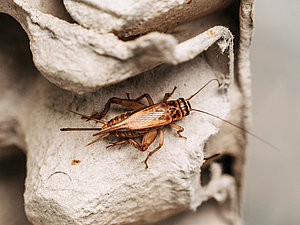Animal Welfare and Protection
The central concern of our research with and on farm animals is to improve their husbandry conditions in terms of animal welfare and to derive solutions for sustainable and animal-friendly farm animal husbandry. (see also Topic "One Health").
Animal-friendly husbandry requires individual and situational care in which the animals can perform their normal behaviour and stress is avoided. For this, we need to better understand the animals and their needs in terms of health, behaviour, perception and evaluation of the environment.
Our research focuses, among other things, on digital animal welfare monitoring and livestock-environment interactions. The knowledge gained is used to better harmonise the needs of farm animals and environmental conditions and to identify and mitigate environmental stress, e.g. due to weather extremes, by means of improved husbandry systems at an early stage.
The ATB does not have an own stock of animals. However, for trials with insects as an alternative bioresource stocks with relatively few animals are kept temporarily.
In our research, we carry out experiments with livestock animals in existing husbandry systems in cooperation with practical partners, usually with cattle, pigs, horses and chickens. We record individual animal adaptation reactions such as performance, vitality, illness, stress and behaviour with the help of various non-invasive sensors. The sensors are attached to the animal, for example, with the collar, belly belt or fetlock. We also use a rumen bolus to measure, among other things, drinking-, chewing- and behaviour activity in cattle. The sensor is swallowed by the animal and then remains permanently in the rumen. The investigations are supplemented by video recordings and climate sensors.
The majority of our experiments with animals are not subject to authorisation. All tests are carried out in close consultation with the Brandenburg State Office for Labour Protection, Consumer Protection and Health (LAVG), which is responsible for animal welfare.
In our research with edible insects, we are guided by the current state of knowledge in research with regard to space requirements, species-appropriate husbandry, suitable food and inactivation, and follow an animal-ethical approach that includes all living creatures equally.
So far, invertebrates such as insects are not protected under animal welfare law (except for armoured crabs and octopuses), and there are no husbandry regulations in Germany.
There is still a considerable need for research in this area. Our research contributes to advancing knowledge about species-appropriate husbandry.
Animal Welfare Officer at ATB:
Dr. med. vet. Gundula Hoffmann



